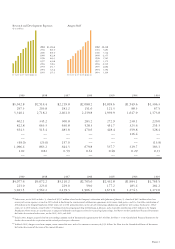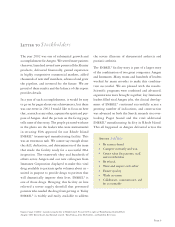Amgen 2002 Annual Report Download - page 15
Download and view the complete annual report
Please find page 15 of the 2002 Amgen annual report below. You can navigate through the pages in the report by either clicking on the pages listed below, or by using the keyword search tool below to find specific information within the annual report.
processes. These proteins often serve as the starting point for the development of potential
new product candidates. One of the discoveries to emerge from Amgen’s genomics research
is osteoprotegerin, a protein found to be important in maintaining bone density. This
discovery may one day play a role in new therapeutic treatments for bone-related diseases,
including osteoporosis and metastatic bone disease.
Amgen’s small molecule research program complements and often builds on the investiga-
tional leads developed in its biologics and genomics research. Small molecules derived through
chemical synthesis may present viable therapeutic alternatives to larger, naturally occurring
proteins. These drugs are often small enough to be administered orally and to penetrate and
directly target molecular structures within a cell.
Cinacalcet hydrochloride, Amgen’s first small molecule therapeutic in development, entered
phase 3 clinical trials in December 2001. Licensed from NPS Pharmaceuticals, Inc., it is an
orally active compound that specifically binds and modulates the calcium-sensing receptor
on the surface of the parathyroid gland, decreasing the secretion of parathyroid hormone.
Excessive secretion of parathyroid hormone occurs in 85% of patients with end-stage renal
disease and can result in a variety of serious medical complications.
Keratinocyte growth factor (KGF) is a tissue growth factor that targets epithelial cells.
Amgen researchers are studying its potential use in the treatment of radiation and
chemotherapy-induced oral mucositis. A phase 3 clinical trial evaluating the effects of KGF
in decreasing the incidence and duration of oral mucositis in patients with hematologic
malignancies undergoing chemotherapy and radiation therapy with autologous PBPC
transplantation was recently completed. Preliminary analysis of the data suggests that KGF
was well-tolerated, and reduced the duration and incidence of severe mucositis in those
who received it, as compared to placebo. Plans are in place to expand these studies to other
oncology indications.
Epratuzumab, licensed from Immunomedics Inc., is a humanized monoclonal antibody
currently being evaluated in the treatment of non-Hodgkin’s lymphoma (NHL). Preliminary
research has suggested that epratuzumab, in combination with another monoclonal
antibody, Rituximab, may be effective in treating NHL patients who have failed to respond
to Rituximab alone.
During 2002, as part of the acquisition of Immunex, Amgen became a party to the Immunex-
Abgenix agreement for joint development and commercialization for ABX-EGF, a fully human
monoclonal antibody created by Abgenix, Inc. Amgen and Abgenix have a series of phase 2
clinical trials underway to evaluate the safety and tolerability of ABX-EGF for the treatment of
several types of cancer, including kidney, colorectal, prostate, and non-small-cell lung cancer.
Page 13
























